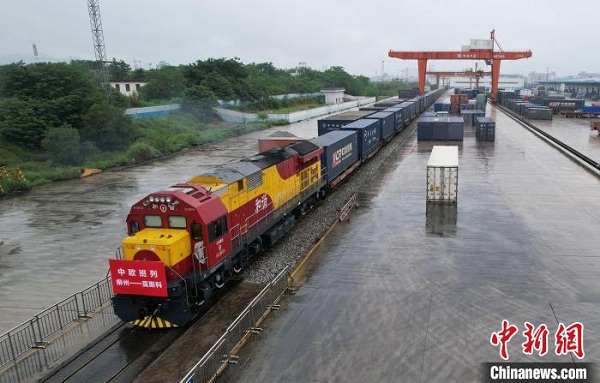Guangxi heavy machinery exports via China-Europe train up

A China-Europe freight train loaded with heavy machinery leaves Liuzhou. [Photo by Li Chenhua/China News Service]
Guangxi Zhuang autonomous region has dispatched more than 10,000 metric tons of heavy machinery, worth 240 million yuan ($36 million), as of May 23 since it started using China-Europe freight train to export heavy machinery on May 18, 2021.
A China-Europe freight train loaded with 74 pieces of heavy machinery, including loaders, graders, and rollers, departed from Liuzhou on May 23 and will travel 11,314 kilometers in 20 days to Vorsino Station in Russia's Moscow after crossing the border at Manzhouli in North China's Inner Mongolia autonomous region. It was the 10th China-Europe freight train that Guangxi has operated this year.
Tang Guide, director of the Liuzhou Cargo Center of China Railway Nanning Group, noted that Liuzhou has dispatched 400 twenty-foot equivalent units (TEU) of containers this year, of which more than half of them were for heavy machinery.
Railway departments have deepened communication with enterprises to learn about their cargo's category, size, and loading demands to optimize transport plans, as well as to shorten operating time.
The China-Europe freight train has long been considered as a main transportation artery supporting the global industry and supply chains with stable and efficient logistics services, especially after the outbreak of the COVID-19 pandemic. Customers can go though one-stop customs clearance on China Railway's 95306 digital checkpoint system, achieving faster cargo clearance speed.
As of now, the China-Europe freight train routes from Liuzhou to Moscow and from Nanning to Kazakhstan have begun normalized operation, bringing seamless connections between China-Europe freight trains and the New International Land-Sea Trade Corridor.
It is expected to help enterprises in middle and west China realize the smooth operation of industry and supply chains, as well as help Guangxi formulate the new dual circulation development pattern in which domestic and overseas markets reinforce each other with the domestic market as the mainstay.
